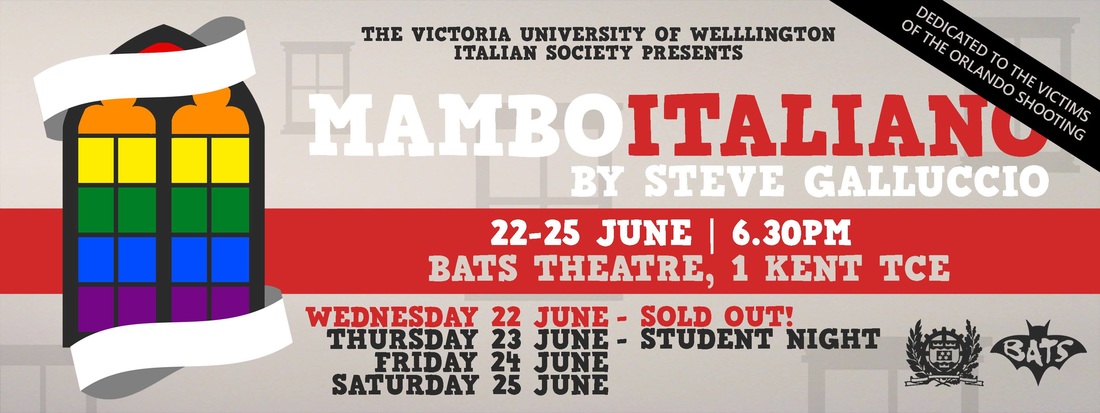Jessie Cooper
The play begins with the Barbieri family at dinner: the nervous and overbearing mother, the bumbling father, the rebellious daughter, and the charismatic son. This kind of scene is possibly a feature in every modern American sitcom ever, but the pieces of Italian/New Zealand culture inserted throughout gave it a more distinctive and characteristic flavour which was received favourably by the attentive opening night audience. Finnian Nacey, playing mother Maria Barbieri, immediately demands attention. This character could very easily have fallen into two-dimensional farce, but Nacey triumphs in a tender yet charismatic portrayal.
As dinner continues we learn that son Angelo has moved away from home - a point of contention with the family. What his parents are yet to learn is that this is due to him living with his male partner – indeed, they are not even aware of Angelo’s sexuality, which becomes the focal point of the story. Throughout the rest of the show we watch Angelo and his partner Nino come to terms with their sexuality, as they seek the acceptance of their families and face the terrifying rollercoasters of love and denial that propel us along the way.
Originally written by Canadian playwright Steve Galluccio about his experiences growing up in an Italian/Canadian family, Jay Èvett cleverly and seamlessly adapted the production to take place in Wellington’s Island Bay. This serves the production well, with some of the biggest laughs coming from the local references. A dig at the infamous Island bay bike lanes was a particular favourite.
The staging is impressive, especially within the confident and swift scene changes which never once leave the audience to wait more than a second in darkness. All credit to director Anastasia Matteini-Roberts for blocking with such efficiency in these moments. These are aided by simple yet effective lighting designs created and operated by Bernadine Gladding. Jack Hallahan too, must receive credit as scenic designer. The stage is simply decorated with layers of hanging windows, but with each change of scene, different pairs of windows are illuminated to aid the varying settings without large set movement.
The first act of the show has a certain tentativeness to it, with moments of overlapping lines and mistaken names. This can most likely be attributed to opening night nerves from the otherwise excellent cast, who recover from these moments quickly. Rory Hammond as father Gino Barbieri even seemed to thrive in these instances with his natural comedic timing, never missing a beat.
At times Mambo Italiano is at the mercy of its script. Galluccio’s writing has tendency to rely too heavily on cliches both in character and situation. However, I praise the director and actors for rising above this, finding new ways to present old roles. The hoards of hearty laughter from the audience a testament to this. Alexa Zelensky in particular gives an admirable performance as Pina Lunetti, a woman desperate for companionship. I found Galluccio’s writing for Pina to be very dated and shallow, but Zelensky overcomes this with zest and clear natural ease on stage.
This season is fittingly dedicated to the victims of the recent Orlando massacre. Mambo Italiano touches on important issues of overcoming the ignorance and fear of others which Orlando so devastatingly reminded us is still desperately needing to be addressed. Sixteen years after it was first performed, these issues remain with us.
Mambo Italiano is an enjoyable and poignant show with a very talented cast. It is clear the amount of time, energy and love have been invested into this show, and I highly recommend you head down to BATS theatre between the 22-25th of June to enjoy it.






